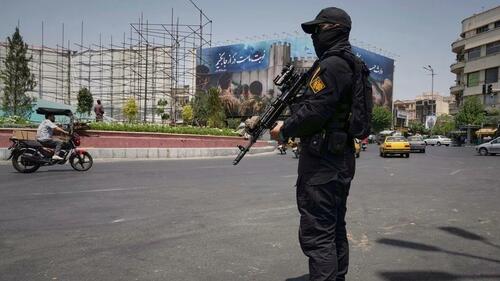Iranian police arrested around 21,000 people on various charges during the 12-day war with Israel, Iran’s national police force reported on Tuesday. According to local media, more than 7,850 public tips were received during the fighting, leading to the arrests.
The spokesperson of the Iranian police, Saed Montazer al-Mahdi, noted that the Iranian Cyber Police (FATA) handled 5,700 cybercrime cases, including internet fraud, unauthorized withdrawals, and a cyber attack on the Nobitex exchange.
He said 2,774 “illegal citizens” were detained, with 261 people arrested on suspicion of espionage and 172 detained for unauthorized filming – some for filming “sensitive centers” around the country. Examinations of the suspects’ mobile phones led to the opening of 30 special security cases.
Speaking on the Evin Prison incident, Mahdi stated that police arrested 127 “security and political” inmates during an escape attempt, including two of whom were dressed in firefighter uniforms.
Fars News Agency reported on July 25 that more than 700 people had been detained over the previous 12 days on charges of “security cooperation with Israel.”
Separately, judiciary spokesman Asghar Jahangir said on 22 July that 75 prisoners escaped during an Israeli missile strike on Evin Prison.
According to Shargh Media Group, Iranian Minister of Intelligence Ismail Khatib said, “The intelligence and security organizations have the resources [personnel, assets, and operational capabilities] to mobilize them both internally and within the regime itself. During the imposed 12-day war, we witnessed seven million public reports.”
He added, “We hope that as this unity has been the axis of destroying all influence, hostility, conspiracy, and sedition, we will all be able to protect this unity and cohesion.”
During the June war, Israel launched coordinated attacks inside Iran, killing senior military and intelligence officials, nuclear scientists, and striking key military sites and administrative infrastructure.
Analysts speculate that the purpose of striking administrative buildings and infrastructure is to weaken the Iranian government’s grip and control over its border provinces with the hope of seeding unrest and separatist movements.
Both during and after the war, Iranian security forces seized large caches of explosives, drones, and weapons, along with workshops used for manufacturing unmanned systems from within the country itself.
Since then, the hunt for infiltrating agents has continued across the country, with leaders urging citizens to “maintain their vigilance, as they showed during the war.”
Loading recommendations…


















